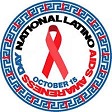
Today is the official designated National Latino AIDS Awareness Day, observed by a growing list of organizations and counties across the U.S. such as The Latino Commission on AIDS (LCOA) and The Hispanic Federation. Events organized throughout the day focus on educating the Latino community on prevention methods, testing, and awareness of HIV. This year’s theme is “Hispanics United to End AIDS”.
In honor of National Latino AIDS Awareness Day, organizations like the McHenry County Department of Health (MCDH) in Illinois, are offering free and confidential testing and counseling for those individuals considered high risk. They will also be providing Sexually Transmitted Infection (STI) testing throughout the day.
The HIV/AIDS epidemic continues to disproportionately affect the Latino community in the U.S., with Latinos accounting for 20% of new HIV infections, according to the Center for Disease Control and Prevention (CDC) and their data from 2009. Since the onset of the epidemic, almost 18,000 Latinos with AIDS have died in the U.S.
The CDC also estimates that the number of Latino men with AIDS nearly doubles that of white men, and the number of Latina women with AIDS quadruples the number of white women with the same. Additionally, Latinos are known as “late-testers”, with 36% of Latinos diagnosed with the disease within 12 months of their HIV positive test result.
Staying in line with the theme “Hispanics United to Ends AIDS,” Latinos are encouraged to get tested, to seek medical care early if found to be HIV positive, to protect themselves and their partner, and to seek education about the matter.
“It is clear, we need to increase our efforts at the local levels to reach our underserved Latino communities and test earlier and reduce infection rates,” says Hilda Crespo, Vice President of The ASPIRA Association. “Limited access to prevention and care programs, cultural and language barriers, and immigration status issues all contribute to this situation.
National Latino Aids Awareness Day
Center for Disease Control

Recent Comments